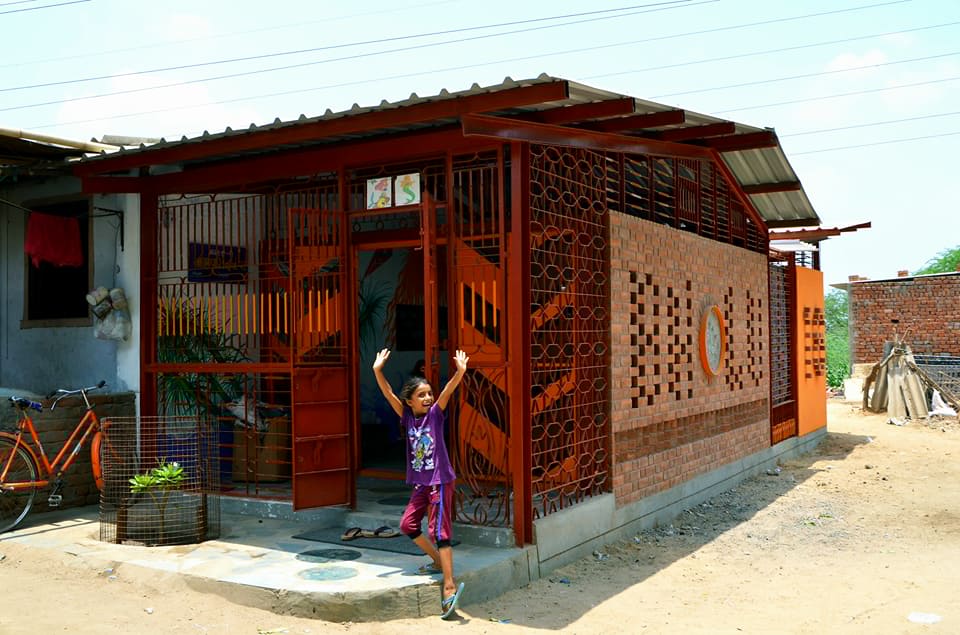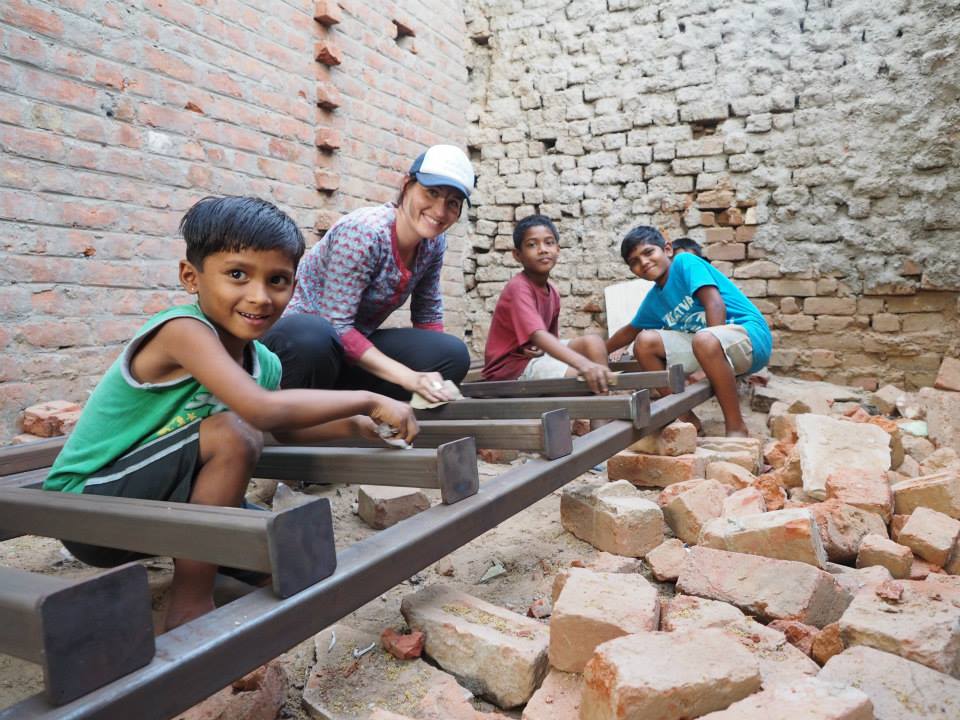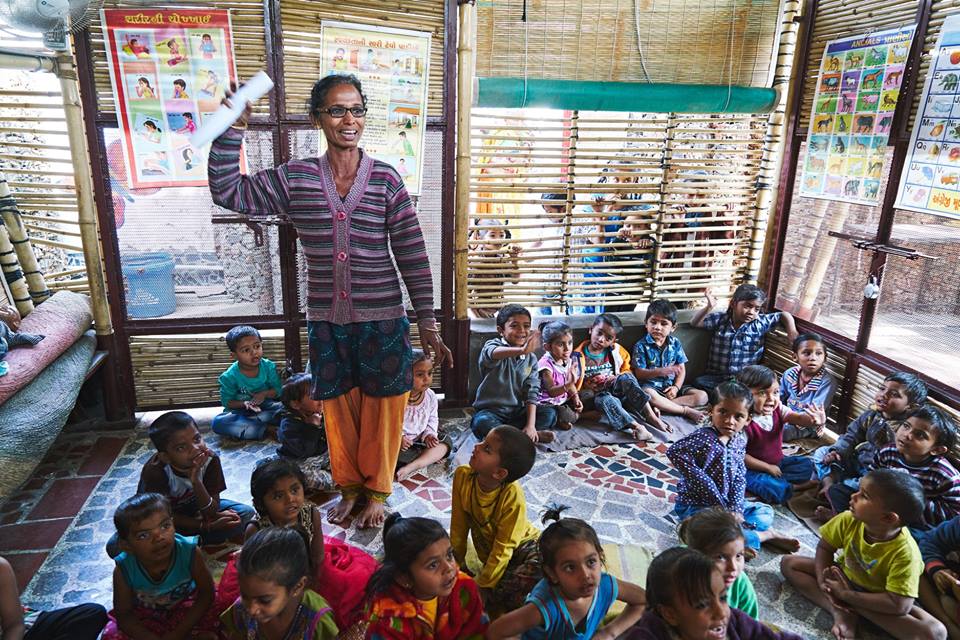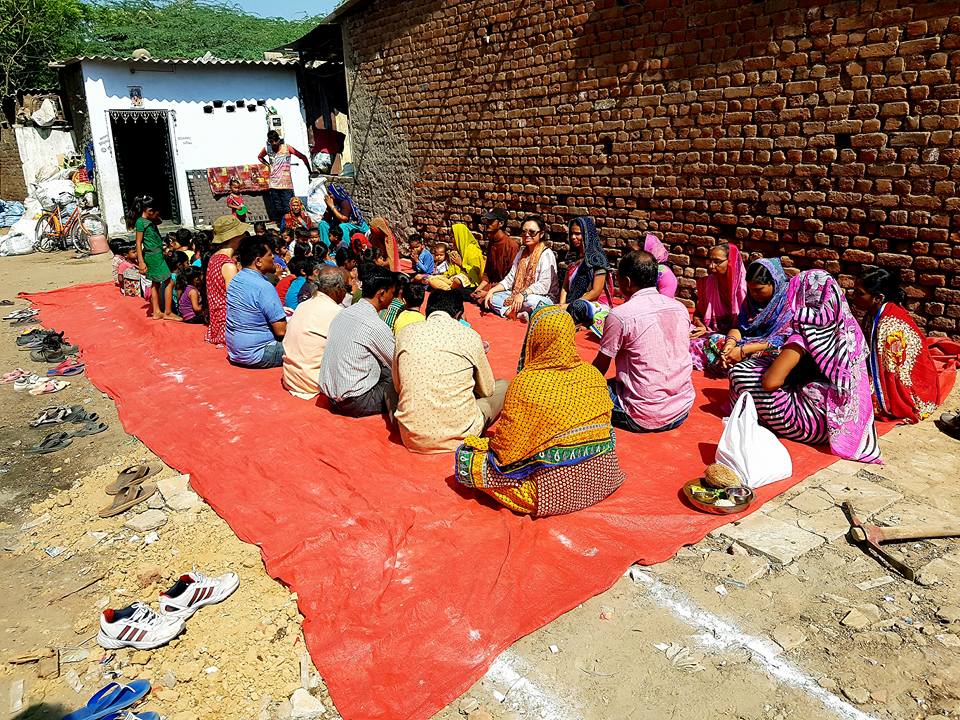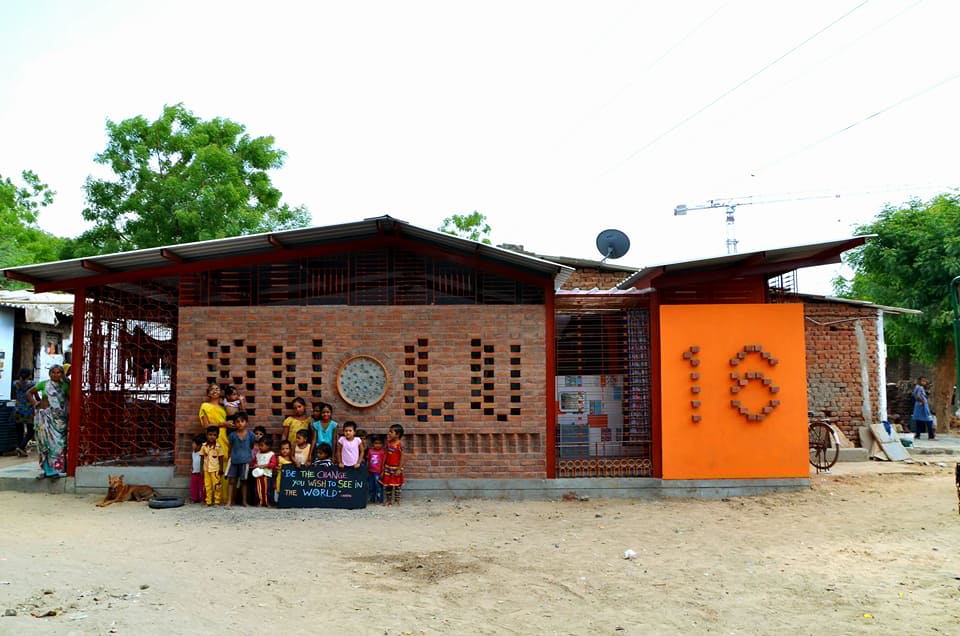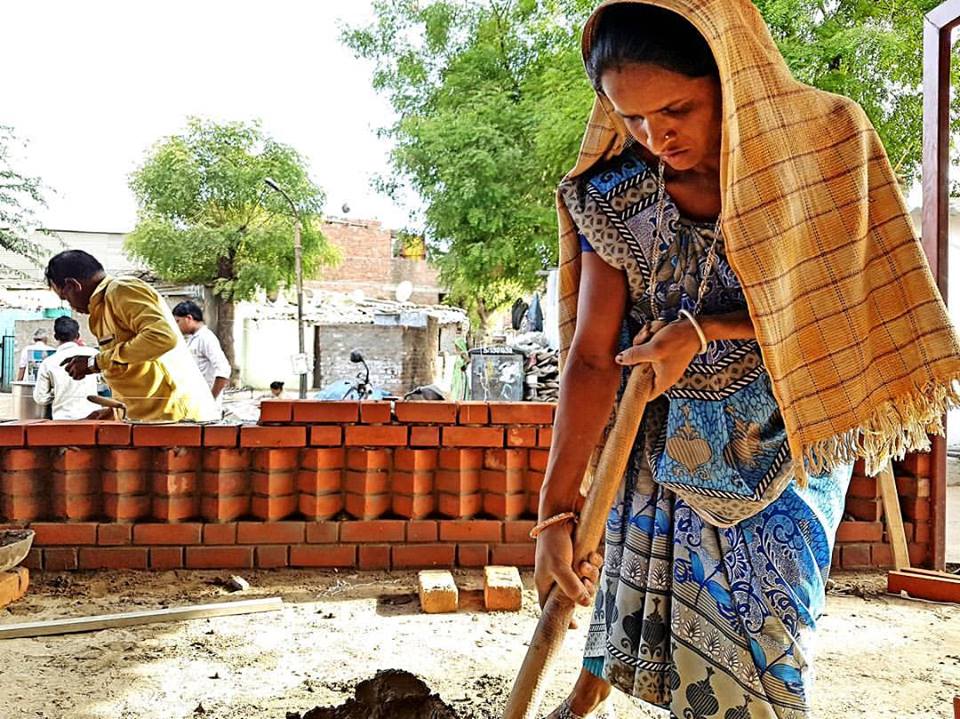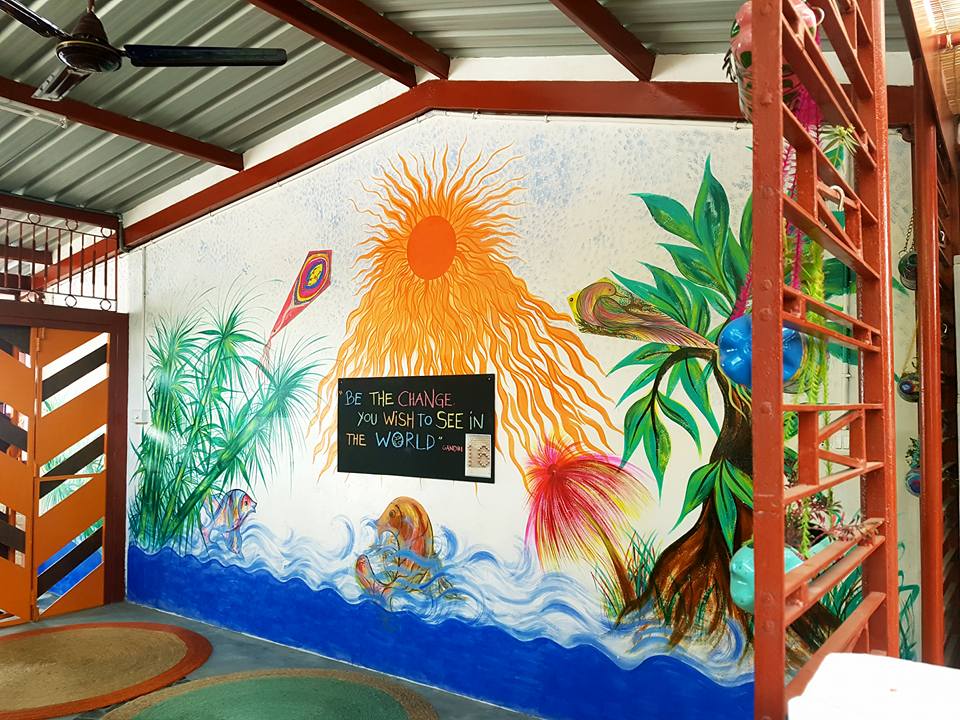Architecture is so often a luxury afforded only to the wealthy. However, good design should be a universal right that can change the everyday lives of those living in the lowest most vulnerable societies. So often, it is the children in these communities that can benefit the most.
The United Nations created 17 Sustainable Development Goals – a blueprint to achieve a better and more sustainable future for all. Goal Number 4 states that the key to bringing about change is from the grassroots up. Change can occur with good design and can be as simple as providing a safe, joyful, well-ventilated space for children who often live stressful lives in overcrowded and noisy slums.
The Anganwadi Project (TAP) is a Sydney-based grassroots organisation which started 11 years ago to address this problem by designing and building beautiful anganwadis (or pre-schools) in the slum areas of Ahmedabad, Gujarat India. The existing anganwadis are generally run for a few hours a day in dark rooms in local slum houses. They are often sweltering corrugated iron boxes in the 45-degree heat and have little or no light or ventilation, making it impossible for the children to learn. The Anganwadi Project focusses on designing simple, beautiful spaces where young children can find an escape from their everyday lives, learning in a safe and comfortable environment.
PHOTO CREDIT: The Anganwadi Project
The organisation came about from a chance meeting in 2007 of the 2 co-founders, myself (Jane Rothschild) who at the time was a director of the organisation, Architects Without Frontiers and Jodie Fried, a designer. From that chance meeting came the re-building of one small school and the start of a collaboration that led to the founding of The Anganwadi Project.
TAP have now built 16 anganwadis, for a budget of $10,000- 12,000 AUD for each school. We have since positively affected the lives of over 500 children and have sent more than 30 volunteer architects and designers to India to work and supervise these projects.
We work in collaboration with a local Indian NGO, Manav Sadhna, based in the Gandhi Ashram. Their Mission is to continue Gandhi’s work supporting the poorest and most marginalised communities.
PHOTO CREDIT: The Anganwadi Project
Over the last 11 years, we have recruited extraordinary, dedicated Australian architects and designers who have each volunteered to live and work in Ahmedabad for a minimum of 6 months. Their work is both demanding and rewarding working closely with the community in the design and construction process of each school and employing local builders and skilled artisans.
Our volunteers often come to the project from commercial offices skilled in the design of multi-million dollar projects in the corporate architecture world. Their new challenge is to spend 6 months in overcrowded and challenging slum conditions working in 45-degree heat to
design a one-room pre-school the size of 2 car garage.
What is an Anganwadi and why are they important?
An “anganwadi” means a courtyard shelter in India. A system of anganwadis (or pre-schools) were developed in 1975 by the Indian government to alleviate malnutrition. The anganwadis provide one meal a day to the slum children under 6 years old but also provide lessons in health and hygiene and literacy in a nurturing preschool environment. The children are weighed and measured to ensure that they thrive, and to make sure they receive adequate health care.
In addition to nutrition, an anganwadi also provides much needed support for vulnerable adolescent girls and pregnant mothers as well as reaching out to address the health of the broader local community. Girls and mothers learn about contraceptive counselling, pregnant mother support and basic health care.
PHOTO CREDIT: The Anganwadi Project
The anganwadi also has a vital role in ensuring a girl’s education. With the smaller children in the family attending an anganwadi, the older sisters are freed of their responsibility of child care enabling them to attend primary school, greatly enhancing their educational chances for the future.
The mothers are then also freed to go to work, providing a stable income for their families. The women in these families are often ‘rag pickers’ who go out all night to collect and sort the city’s rubbish for a tiny income, sorting the rubbish in their houses. This income is critical, as many of the men suffer from problems with alcoholism and unemployment, putting the family’s income at risk.
Through small actions you can make great changes
Mahatma Gandhi
Over the last 11 years, we have learned that the flow-on effects of this small project have benefits far more reaching than simply providing an educational facility in the community. The broader impact for the community goes much deeper.
PHOTO CREDIT: The Anganwadi Project
The anganwadis not only provide the children with beautiful peaceful spaces in which to learn, but they also become community hubs in which the mothers and children can gather. And for the teachers in the schools, student attendance has increased and teacher pride and satisfaction has flourished. When adolescent girls in the community work along our female volunteers, they tell us that it makes them realise what they too are capable of.
Our on-going engagement with the same community, year after year, has built long-term trusting and loving relationships. And by engaging everyone from the smallest child to the community elders in the process, we have ensured both the ongoing sustainability of the project and the strength and support of the community.
How has this small grass-roots NGO impacted Sydney’s sustainable goals?
This philosophy is ingrained in our volunteers through their work with Manav Sadhna and the slum communities.
When the TAP volunteers return to Australia after 6 months working in the slums communities, they come back with a vastly altered perspective of the role that architecture and design plays in our urban lives. They learn that engaging the community in the process makes for better and more sustainable design, and that the process is often more important than the finished building.
You must be the change you wish to see in the world
Mahatma Gandhi
From this experience, they often take a new career path in community-based design, working to use design as a tool to engage a community in a project. Whether it is making Sydney more accessible and welcoming to disenfranchised youth, or focussing on community consultation, they have learnt to develop a far broader perspective of architecture beyond the goal of simply the construction of a building.
They come back to Australia with a focus on designing for the 90% and not just the few. TAP volunteers follow pathways such as volunteering their architecture services for an Islamic Women’s Community Centre, working with children in construction, or studying how the informal patterns of public spaces in slum areas act to create a sense of community.
On a broader scale, India addresses problems such as malnutrition and child health in a highly successful grassroots outreach program that reaches everyone in a slum community. According the Australian charity, Foodbank, hunger is a hidden crisis in Australia, with over 3.6 million people experiencing food insecurity every year, 27% of which are children. There are perhaps lessons to be learnt from the slums of India of the importance of community outreach and engagement which we in Sydney could take on board to better serve struggling families to gain a better start in life.
For more information about The Anganwadi Project: www.anganwadiproject.com


